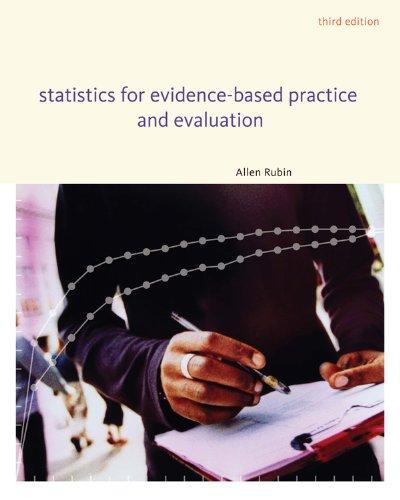Table of Contents
Cover image
Title page
Copyright
Dedication
Preface
Acknowledgments
Part 1: Understanding Statistical Methods
1. Identifying levels of measurement: Nominal, ordinal, interval, and ratio
Statistical technique in review
Research article
Study questions
Answers to study questions
Exercise 1 Questions to be graded
2. Identifying probability and nonprobability sampling methods in studies
Statistical technique in review
Study questions
Answers to study questions
Exercise 2 Questions to be graded
3. Understanding the sampling section of a research report: Population, sampling criteria, sample size, refusal rate, and a�rition rate
Statistical technique in review
Research article
Study questions
Answers to study questions
Exercise 3 Questions to be graded
4. Understanding reliability of measurement methods
Statistical technique in review
Research article
Study questions
Answers to study questions
Exercise 4 Questions to be graded
5. Understanding validity of measurement methods
Statistical technique in review
Research article
Study questions
Answers to study questions
Exercise 5 Questions to be graded
6. Understanding frequencies and percentages
Statistical technique in review
Research article
Study questions
Answers to study questions
Exercise 6 Questions to be graded
7. Interpreting line graphs
Statistical technique in review
Research article
Study questions
Answers to study questions
Exercise 7 Questions to be graded
8. Measures of central tendency: Mean, median, and mode
Statistical technique in review
Research article
Study questions
Answers to study questions
Exercise 8 Questions to be graded
9. Measures of dispersion: Range and standard deviation
Statistical technique in review
Research article
Study questions
Answers to study questions
Exercise 9 Questions to be graded
10. Description of a study sample
Statistical technique in review
Research article
Study questions
Answers to study questions
Exercise 10 Questions to be graded
11. Interpreting sca�erplots
Statistical technique in review
Research article
Study questions
Answers to study questions
Exercise 11 Questions to be graded
12. Algorithm for determining the appropriateness of inferential statistical techniques
Statistical technique in review
Study questions
Answers to study questions
Exercise 12 Questions to be graded
13. Understanding Pearson product-moment correlation coefficient
Statistical technique in review
Research article
Study questions
Answers to study questions
Exercise 13 Questions to be graded
14. Understanding simple linear regression
Statistical technique in review
Research article
Study questions
Answers to study questions
Exercise 14 Questions to be graded
15. Understanding multiple linear regression
Statistical technique in review
Research article
Study questions
Answers to study questions
Exercise 15 Questions to be graded
16. Understanding independent samples t-test
Statistical technique in review
Research article
Study questions
Answers to study questions
Exercise 16 Questions to be graded
17. Understanding paired or dependent samples t-test
Statistical technique in review
Research article
Study questions
Answers to study questions
Exercise 17 Questions to be graded
18. Understanding analysis of variance (ANOVA) and post hoc analyses
Statistical technique in review
Research article
Study questions
Answers to study questions
Exercise 18 Questions to be graded
19. Understanding Pearson chi-square
Statistical technique in review
Research article
Study questions
Answers to study questions
Exercise 19 Questions to be graded
20. Understanding Spearman rank-order correlation coefficient
Statistical technique in review
Research article
Study questions
Answers to study questions
Exercise 20 Questions to be graded
21. Understanding Mann-Whitney U test
Statistical technique in review
Research article
Study questions
Answers to study questions
Exercise 21 Questions to be graded
22. Understanding Wilcoxon signed-rank test
Statistical technique in review
Research article
Study questions
Answers to study questions
Exercise 22 Questions to be graded
Part 2: Conducting and Interpreting Statistical Analyses
23. Selecting appropriate analysis techniques for studies
Statistics to address basic difference research questions and hypotheses
Statistics to address basic associational/correlational research questions and hypotheses
Applying inferential statistics to population data
Study questions
Answers to study questions
Exercise 23 Questions to be graded
24. Describing the elements of power analysis: Power, effect size, alpha, and sample size
Effect size
Study questions
Answers to study questions
Exercise 24 Questions to be graded
25. Conducting power analysis
Power analysis 1: Cohen’s d
Power analysis 2: Cohen’s f
Power analysis 3: Pearson r
Power analysis 4: R2
Power analysis 5: Odds ratio
Power analysis 6: d
Power analysis 7: Cohen’s dz
Study questions
Answers to study questions
Exercise 25 Questions to be graded
26. Determining the normality of a distribution
The normal curve
Skewness
Kurtosis
Tests of normality
SPSS computation
Interpretation of SPSS output
Study questions
Answers to study questions
Data for additional computational practice for Questions to be graded
Exercise 26 Questions to be graded
27. Calculating descriptive statistics
Measures of central tendency
Measures of dispersion
Sampling error
SPSS computations
Interpretation of SPSS output
Study questions
Answers to study questions
Exercise 27 Questions to be graded
28. Calculating Pearson product-moment correlation coefficient
Research designs appropriate for the Pearson r
Statistical formula and assumptions
Hand calculations
SPSS computations
Interpretation of SPSS output
Final interpretation in American Psychological Association (APA) format
Effect size
Study questions
Answers to study questions
Data for additional computational practice for Questions to be graded
Exercise 28 Questions to be graded
29. Calculating simple linear regression
Research designs appropriate for simple linear regression
Statistical formula and assumptions
Hand calculations
SPSS computations
Interpretation of SPSS output
Final interpretation in American Psychological Association (APA) format
Study questions
Answers to study questions
Data for additional computational practice for the Questions to be graded
Exercise 29 Questions to be graded
30. Calculating multiple linear regression
Research designs appropriate for multiple linear regression
Statistical formula and assumptions
SPSS computations
Interpretation of SPSS output
Final interpretation in American Psychological Association (APA) format
Study questions
Answers to study questions
Exercise 30 Questions to be graded
31. Calculating t-tests for independent samples
Research designs appropriate for the independent samples ttest
Statistical formula and assumptions
Hand calculations
SPSS computations
Interpretation of SPSS output
Final interpretation in American Psychological Association (APA) format
Study questions
Answers to study questions
Data for additional computational practice for Questions to be graded
Exercise 31 Questions to be graded
32. Calculating t-tests for paired (dependent) samples
Research designs appropriate for the paired samples t-test
Statistical formula and assumptions
Hand calculations
Another random document with no related content on Scribd:
was disclosed by their conduct as soon as they believed themselves emancipated from the restraints under which they had chafed so long. They exulted in every form of sacrilege. Dressed in sacerdotal habiliments, they travestied the solemn ceremonies of the mass. They defiled and trampled upon the Host. The churches were filled with laughing, jeering crowds that polluted every portion of the sanctuary. Sacred images, donated by pious monarchs and blessed by famous prelates, were broken to pieces and burnt. Ecclesiastical hatred had, as an indispensable sign of regeneration, forced all Moslem converts to eat pork, a kind of food doubly offensive from inherited prejudice and Koranic prohibition. In retaliation for this annoying requirement, the insurgents, with mock solemnity, and invested with all the paraphernalia of Catholic worship, sacrificed hogs upon the Christian altars. Every form of violence, every outrage which newly-found freedom exasperated by the memory of longcontinued injury could devise, was perpetrated by the enraged Moriscoes. So unbridled was their fury that even the common usages of war were constantly violated; prisoners taken in battle were put to death without mercy, and it was publicly declared that not a Christian should be left alive within the insurgent territory. This resolution, promulgated without his knowledge, was discountenanced by Ibn-Ommeyah, and he deposed the commanders who had by their arbitrary conduct and impolitic cruelty insulted the honor of his crown, but not until irreparable wrong had been committed.
The news of the insurrection, the exaggeration of its extent, and the horrors which followed in its train produced a general panic in Granada. All Christians who could do so took refuge in the Alhambra. The Moriscoes, in vain protesting their innocence, barricaded themselves in their houses, and such as imprudently ventured into the streets perished at the hands of the infuriated mob. The contest of jurisdiction which had so long existed between the civil and military authorities, each of whom claimed the supremacy, and neither of whom was willing to sacrifice his pretensions, even in the face of a cunning and dangerous enemy, added to the perplexities of
the situation. Thoroughly acquainted with the discord of their masters, the Moriscoes, already elated by the exploits of their countrymen, of which they had early and accurate intelligence, began to manifest a suspicious activity. The prospect of war called to arms the turbulent and dissolute spirits of the kingdom. The feudal laws, which were still in force in the Peninsula, prevented, through the disputes of the nobles for precedence, that submission to authority requisite for successful operations. With these independent bands there was no question of patriotism; the national standard was merely a rallying point for pillage, and that commander was the most popular whose neglect of discipline afforded the greatest opportunities for unbounded license. These troops were commanded by the Marquis de Mondejar, Governor of Granada, and the Marquis de los Velez, both of whom were indebted rather to their names than to their qualifications for the prominence they enjoyed, for the one was without discretion and the other without experience.
In the campaign that ensued every consideration of military virtue, of pity, of humanity, was cast aside. The Christians fought with an energy dictated by fanaticism and rapacity, the Moors with all the reckless courage of despair. The Castilian officers, so far from restraining the excesses of the soldiery, encouraged them in order to increase their ferocity and render reconciliation impossible till all the available booty could be secured. The Moors of Granada paid dearly for the apathy with which they had received the overtures of their more daring countrymen. The lawless rabble of the Spanish camp, which recognized no restraint but that of superior force, was quartered upon the wealthy citizens of the Albaycin. It is notorious that even the plain-spoken old chroniclers of the time blushed to record the outrages inflicted by these savage volunteers, callous to every appeal of decency or honor. An extraordinary tax of six thousand ducats was imposed upon the Albaycin for the purpose of provisioning the army; and the Moorish farmers of the Vega were compelled under heavy penalties to furnish every day twenty thousand pounds of bread at a price arbitrarily fixed by the authorities. Thus the unhappy Moriscoes of the capital, too timorous
to second an attempt to regain their independence, were forced to contribute to the discomfiture of their friends, to undergo unspeakable insults and frightful suffering, and in the end to sacrifice their property and in many instances their lives as the result of their distrust of a cause which lack of intelligent co-operation rendered hopeless from the very beginning. The activity of the Spanish generals, and the superiority in numbers of their troops, soon gained for them the advantage. The campaign resolved itself into a succession of skirmishes and marauding expeditions, whose monotony was occasionally relieved by promiscuous butchery. In consequence of a disturbance provoked by the insolent conduct of a Spanish soldier, thirteen hundred prisoners, of whom a thousand were women, were massacred at the Castle of Jubiles. The plans of the royal commanders were hampered by the insubordination of the soldiery; their insatiable greed placed the army in desperate situations, whence by good fortune alone it could be extricated, and the frequency of desertion seriously threatened the efficiency of a force unrestrained either by self-respect or military law. Driven from point to point, the army of Ibn-Ommeyah was finally beaten and dispersed. The Alpujarras were occupied by lines of fortified posts, which prevented the assembling of any considerable body of insurgents; the mountaineers of the adjacent sierras were gradually reduced to submission, and the insurrection was at last only represented by the fugitive prince and a handful of followers, whose fidelity was sorely tried by the tempting reward offered for the head of their sovereign.
The Moriscoes, terrified by the misfortunes which they had undergone, offered, for the sake of present security, to submit to any conditions that might be imposed,—to deportation, to exile, to confiscation, to the maintenance of the troops that might be detailed as their guards against future hostility. Different and irreconcilable opinions prevailed among the officials of the crown as to the policy to be adopted; one party advocated amnesty, another extermination. In the mean time, while their superiors were wrangling, the soldiers pursued without interruption the agreeable diversion of rapine.
Although hostilities had ceased, small bands of military brigands roamed everywhere without control, robbing houses, destroying property, ravishing women. Inoffensive peasants, who had never borne arms, were seized, carried to Granada, and publicly sold as slaves in the markets of the city by these outlaws, with the knowledge and connivance of the authorities. The latter quarrelled over the division of the spoil and the questionable distinction acquired by conflagration and massacre. No faith was kept with the vanquished. Safe-conducts signed by the highest officials were not respected. No Morisco was exempt from molestation and violence; no house was secure from the intrusion of prowling and bloodthirsty ruffians. When a body of Christian troops passed through a Moorish community everything portable departed with it, the rest was burned. There was deliberate method in this wholesale destruction of property. The army desired nothing so little as peace. War had been profitable even beyond expectation. The booty already secured was immense, but the greater portion had as yet escaped the avarice of the conqueror. The general and the common soldier alike cast longing glances upon the wealth of the Albaycin; upon the productive estates of the Vega, still cultivated by Moorish industry; upon the untold wealth in gold and jewels known to be hoarded by the residents of Guadix, Baza, and Almeria. Leaving all else out of consideration, the Moriscoes themselves, who numbered more than half a million, if condemned to slavery, would realize a prodigious sum. These were the sinister motives which urged an indefinite prosecution of the war, and it was not long before the desired object was attained. The Moriscoes, driven to despair by the duplicity of their enemies whose violence they could not resist, again fled to the mountains and sought the standard of Ibn-Ommeyah. The Spanish mob of Granada, excited by rumors of conspiracy, at once massacred the defenceless Moorish occupants of the prisons to the number of several hundred. Their personal effects were appropriated by the governor; their lands were confiscated for the benefit of the crown; and their widows and orphans were reduced to beggary. A judgment of the court subsequently obtained confirmed this arbitrary act, stating that its decision was based upon the fact that, “while some
of the prisoners were actually guilty, all were guilty in intention.” The affair was regarded as a suggestive warning, and in the future the insurgents did not receive or expect assistance from their friends in Granada.
Once more the flames of war were kindled in the sierras, and the scenes of indiscriminate butchery were resumed. The power of IbnOmmeyah, strengthened by thousands of desperate men fleeing from persecution, by the monfis, by the corsairs, and by numbers of savage adventurers from the northern coast of Africa, now became more formidable than ever. That power he exercised with ferocious severity. The discipline of his troops was improved. Marauding parties of Christians from the principal cities were surprised and cut to pieces. Prominent officials who had ventured to advocate surrender were promptly executed for treason. The discouraging and hitherto hopeless task of enlisting the sympathy and aid of the Mohammedan princes of Fez and Algiers was resumed, but with no better prospect of success than before.
Philip, fully informed of the incapacity and mutual distrust of those hitherto charged with the government of Granada, now determined to commit the subjection of the rebels to a general whose rank and talents would command the obedience and check the insubordination of the ill-disciplined bands composing the bulk of the Spanish army. Don John of Austria, his half-brother, the natural son of Charles V., a youth whose opportunities had as yet given little indication of the military genius he possessed, but in whom discerning eyes had already perceived the existence of those brilliant qualities subsequently displayed with such lustre at Lepanto, was assigned to the command.
The greatest enthusiasm was aroused by this appointment. Nobles and peasants alike, ambitious of serving under a prince of the blood, flocked by hundreds to the royal standard. The new commander, although inexperienced, perfected his arrangements with all the caution and skill of a veteran. The army was thoroughly reorganized. Disorder was checked. Outlaws and beggars were
expelled from the camp. As far as the annoying feudal regulations would permit, discipline was enforced. Licensed brigandage, which had done so much to destroy the efficiency of the troops, was punished with impartial rigor. Under these improved conditions the army, which had hitherto resembled a disorderly mob, now assumed the appearance of a compact and formidable force. Meanwhile, the insurgents had not been idle. Instructed by experience and adversity, Ibn-Ommeyah introduced many necessary reforms into his civil and military administration; purchased arms in Africa; invited the presence of corsairs; procured supplies; and, dividing his territory into districts whose arrangement facilitated mutual support and defence, awaited with resolution and confidence the approach of the enemy. The first operations of the campaign were favorable to the Moriscoes, whose successes, while neither material nor decisive, nevertheless resulted in substantial additions to their ranks. Although able to bring several thousand men into the field, their want of artillery, ignorance of engineering science, and traditional dependence on partisan warfare made their victories worthless. The latter were obtained in skirmishes where but a few hundreds were engaged, the nature of the ground and the opportunities for surprise giving unperceived assailants the advantage.
Irritated by these reverses, a decisive step, long contemplated, and frequently from politic motives postponed, was now resolved upon by the government. The rumor of impending revolt was diligently circulated throughout Granada. As no evidence was subsequently disclosed to confirm this report, it was probably entirely fictitious, but it accomplished the object for which it was promulgated. A panic seized the excitable populace, and a universal demand arose for the expulsion of the Moriscoes. The authorities were quick to profit by the commotion and the fears which their own perfidy aroused; and, at a concerted signal, twenty thousand arquebusiers, with lighted fuses, occupied the approaches to the Albaycin. The Moriscoes, when ordered to assemble in their churches, anticipating a massacre, abandoned themselves to despair. It required all the influence of the municipal authorities, and the
royal word of Don John of Austria himself that their lives would be spared, to reassure the terror-stricken prisoners. Crowded together in the aisles, they passed an agonizing and sleepless night. The next morning the males between the ages of ten and sixty years, with their hands bound behind them, were conducted outside the walls, where a decree of perpetual banishment was pronounced against them and their kindred. A few days of grace were accorded to these unfortunates to dispose of, or rather to sacrifice, their personal property; and then, divided into several companies, each escorted by a strong guard, they began their journey towards central Andalusia, Estremadura, and Castile, whither, for purposes of security, it had been decided to conduct them.
The exiles were about eleven thousand in number. They included the descendants of the wealthiest and noblest Moorish families of Granada, and, indeed, of the entire Peninsula. Many of them traced their ancestry back to the princely families of the khalifate, eminent alike for intellectual accomplishments and military renown. In their keeping were the ancient traditions of their race; the rare memorials of the Moslem conquest and domination; the remnants of Arabic literature which had escaped the destructive zeal of Ximenes and the exhaustive search of prying alguazils and inquisitors. Their houses still displayed the splendid decorations peculiar to the palmy days of the emirate; marble halls and alabaster fountains; hangings of embossed and gilded leather; stuccoes that in elegance of design and delicacy of execution equalled those of the Alhambra. In the Vega were many estates, cultivated by their dependents, which returned each year a large and profitable income. All of these landed possessions were unceremoniously appropriated by the Spaniards, and the personal effects sold by the exiles yielded scarcely a tithe of their value. Driven by force from their homes, and despoiled on every side, the Moriscoes pursued their sorrowful way. Reared in comfort and affluence and accustomed to luxury, they were ill-fitted for a long and toilsome journey. Few of the multitude that started arrived at their destination. The hardships incident to travel and exposure to the burning heat proved fatal to hundreds. Many expired
from grief, from hunger, from disease. Others were wantonly killed by their guards, who plundered, without hesitancy or compunction, both the living and the dead. When this source of profit was exhausted, the strongest men and the most attractive women were sold as slaves. The condition of the few survivors who arrived at Seville was so deplorable that even the compassion of ecclesiastics, whose lives had been passed in the infliction of persecution and torture, was excited. The greater portion of the inhabitants, however, regarded these victims of tyranny with indifference or curiosity. The sufferings of tender youth, of decrepit age, of beauty in distress, awakened no sympathy; and if any feelings were exhibited by the throngs that lined the highways along which, under a scorching sun, the fainting exiles staggered, they were those of bitter enmity and of exultation at the misfortunes of heretics who had forfeited all title to humanity through the inherited blood of a despised and conquered race.
No beneficial consequences resulted from this measure, as cruel as it was unwise. The insurgents continued their depredations. Every straggler was killed; and no foraging party whose force was less than that of a regiment could hope to return. The Moriscoes by degrees became more daring, and it was no longer safe for individuals to venture beyond the limits of the camp. The encounters were all to the advantage of the rebels; and the great city of Almeria, by the merest accident, escaped falling into their hands. The latter, however, were not only unable to cope with the entire power of the Spanish monarchy, but were even unprovided with the means necessary for the retention of their paltry conquests. Even in a situation where unity was more than ever indispensable to selfpreservation, the irrepressible tendency of the Arab mind to factional disturbance began to manifest itself. Nine centuries of national disaster had been insufficient to repress the tribal hatred and the thirst for private vengeance which had sapped the vitality and finally torn into fragments the realm of a vast and splendid empire. The Moor was incapable of profiting by experience. The law of reprisal, that accursed legacy of his Bedouin forefathers, had never been lost
sight of, even amidst all the culture and all the wisdom of his civilization. It was the most powerful and effective weapon that his enemies possessed, and it was eternally used to his prejudice. To its aid the Reconquest was far more indebted than to the energy of Alfonso VI. or to the craft of Ferdinand the Catholic. It won more battles than all the conquering sovereigns from Pelayus to Isabella. No Castilian prince had ever failed to recognize its importance or to profit by its employment. And now, in the remote Alpujarras, the last resort of Moorish valor and ambition, it was again to be wielded with even more fatal and demoralizing effects than had ever marked its use since the troublous epoch which followed the decline of the Ommeyade supremacy.
The popularity of Ibn-Ommeyah had of late greatly suffered through the strictness of the discipline which he had inaugurated and the oppressive acts of his advisers, for the most part men of obscure lineage and grasping avarice. The soldiers, accustomed to the exercise of the greatest freedom in their conduct and in their treatment of the enemy, viewed with unconcealed disgust the restraints to which they were subjected. In the councillors of their king, the rich Moriscoes, who had forfeited their lives and expended their treasure in sustaining his pretensions, saw a band of robbers, who abused the opportunities of their positions for their own pecuniary benefit. Especially were those whose wealth made them conspicuous the objects of the selfish animadversion of these baseborn officials. No person of eminence, whether civilian or military officer, was safe from the denunciation of informers. The experience of Ibn-Ommeyah, and his frequent escapes from premeditated treachery, had made him impulsive, vindictive, and cruel. Constantly exposed to danger, he was only too ready to listen to the voice of suspicion, and in the court of a despot the punishment follows swiftly upon the accusation. Besides the alienation of many of his principal adherents from the above-mentioned causes, IbnOmmeyah had recently gained for himself, by an egregious act of folly, the enmity of one of the most powerful tribes in the kingdom.
Among the most distinguished families of Granada was that of the Beni-Alguazil-al-Karimi, in which was vested, by hereditary right, the office of vizier of the district of Ujijar. Inherited rivalry, the pride of conscious merit, and the jealousy of power had made the BeniAlguazil the enemies of the house of Ibn-Ommeyah. Their hostility, manifested upon more than one occasion, had aroused the apprehensions of the Moorish prince; and the assassination of Miguel de Rojas, the chief of the tribe, was, not without probability, attributed to his instigation. In consequence, the Beni-Alguazil, while unwilling to assist the Christian foe, maintained a suspicious and sullen demeanor, and, with the characteristic vindictiveness of the Arab, awaited patiently the moment of reprisal. With a perfidy natural to his character, and from the effects of which he was ultimately destined to perish, Ibn-Ommeyah had adopted the custom of promoting to favor and apparent confidence those whom he had already marked for destruction. Among those who shared this perilous honor was Diego Alguazil, a member of the rival clan, whose animosity had been soothed by the gifts and the consideration he received at the hands of his sovereign. In his harem was a lovely slave, the perfection of whose charms, imprudently disclosed by her master, aroused the curiosity and inflamed the desires of IbnOmmeyah. Considerations of policy or justice were of trifling moment where the ungovernable passions of the Moorish king were concerned; the slave was rudely appropriated without apology or compensation; and this arbitrary invasion of the rights of a subject raised up for Ibn-Ommeyah an implacable enemy. The ambition of the beautiful Zahrâ, who aspired to the position of Sultana, was disappointed by her continuance in an inferior rank, and, her hopes thus blasted, she found in her former master a pliant and serviceable instrument of revenge. The support of other malcontents, dissatisfied with the cruelty and arrogance of their king, was readily secured; the fears of the royal guard of six hundred Turks were excited by an ingenious, but discreditable, stratagem; and IbnOmmeyah, torn from the arms of his women and thrown into prison, perished miserably before morning at the hands of the executioner. His death seemed not entirely unjustifiable, for he proclaimed with
his last breath his secret and unshaken belief in the Christian religion. The hypocrisy, which, for the sake of luxury and power, could feign attachment to a creed that upon the slightest pretext it was ready to betray, was not unworthily punished by the treachery of a slave. Ibn-Abu, a cousin of Ibn-Ommeyah, succeeded to the empty honors and dangerous responsibilities of a tottering throne. The treasures of the palace and the seraglio were divided among the conspirators. The guards, whose fidelity to the new administration was suspected, were disbanded; the unpopular officials, deprived of the power which they had abused and the wealth which they had accumulated by extortion and perfidy, were despoiled and exiled; and the new King, crowned at Lanjar with all the pomp which the limited resources that a fugitive court and an impoverished treasury could command, assumed, with an appearance of confidence, the direction of a government divided against itself and confronted with the combined and resistless power of the Spanish monarchy.
Ibn-Abu, when invested with the royal dignity, of whose precarious character he was perfectly aware, but whose acceptance he was afraid to refuse, was far past the prime of life. In the course of an eventful and romantic career, he had undergone many exciting and hazardous experiences. From his youth identified with the party hostile to the Christians, his fidelity to the Moslem cause had been severely tested on numerous occasions. Implicated with the monfis, he had submitted to torture and had been sent to the galleys rather than betray his comrades. Again, for refusing to disclose the hidingplace of his sovereign, he was subjected to a shocking and indescribable mutilation. His sufferings had confirmed his loyalty and intensified his hatred; the noble qualities with which he was endowed endeared him to his countrymen; but his indecision, his lack of energy, and his inability to profit by the means at his disposal in the presence of any sudden exigency unfitted him for the position of responsibility to which he had been so unexpectedly promoted. In spite of the disadvantages under which he labored, he, however, soon placed his forces upon a more effective footing, and his position was greatly strengthened by the discord of his enemies.
The reforms inaugurated by Don John of Austria proved impracticable when their full import became known to the soldiers and they began to experience the inconveniences attendant upon military restraint. Feudal customs also interfered with the enforcement of discipline; and the lords, fearful of a retrenchment of their own privileges, indulged their vassals in acts of rapine prejudicial to the well-being of the entire army. The quarrels and recriminations of the Marquis de Mondejar and the Marquis de los Velez, so far from being extinguished by the appointment of a commander-in-chief, became more aggravated and violent than ever. The power of the latter was hampered by contradictory orders from Madrid, and the prosecution of energetic measures was prevented by incessant and acrimonious disputes. As soon as the prospect of booty was diminished, the army was threatened with dissolution. Desertions were so common and their effect was so demoralizing that all reviews were abandoned, in order that the enemy might not become acquainted with the diminished numbers of their antagonists. Scores of officers were cashiered for peculation; but their successors, unintimidated by the penalty, followed, without hesitation, their disgraceful example. In the markets of the city, the government supplies were publicly exposed for sale by the commissaries. The camp was filled with spies. Not only had many Moriscoes enlisted with the object of betraying their comrades, but the Spaniards themselves constantly sold both official secrets and arms to the rebels. Entire garrisons mutinied because of the necessary precautions instituted by their commanders; and it was not unusual for parties organized for robbery to leave their posts in violation of the express orders of the general. Of these marauders few returned, but their fate failed to deter others; the love of plunder prevailed over every other incentive; and the safety of the troops was often jeopardized by the misconduct of unprincipled adventurers, whose insolence and insubordination even the highest authority seemed unable to restrain. These breaches of order and discipline were by no means confined to the ranks; every grade of the military was affected; and no less a personage than the Marquis de los Velez himself assumed the right to act independently of the
commander-in-chief, and to disregard all orders from head-quarters unless they suited his convenience or promoted his interest.
The army of Ibn-Abu amounted to twelve thousand men, of whom four thousand were thoroughly drilled arquebusiers. This force, though for the most part well equipped, experienced in war, aided by the advantages of situation, and fighting for liberty on its own ground, was unable to accomplish any important result, even when engaged with a demoralized enemy. The achievements of the Moriscoes, limited to the blockade of a few fortresses and to marauding expeditions that harassed the cultivators of the Vega, are scarcely worthy of notice, still less of detailed narration. In the vicinity of Orgiba and Baza their troops appeared in force, but retired at once at the approach of the Christians. It was only by the practice of treacherous methods that the Moorish tactics ever prevailed. The want of stability and resolution which had proved fatal to the permanence of the Hispano-Arab empire survived in the final operations of the Morisco rebellion. The superior steadiness of the Spanish infantry invariably carried the day, even against overwhelming odds. The Moors were easily disheartened; after a trifling repulse it was impossible to rally them; and, even when protected by fortifications, they could not withstand the dogged pertinacity which was a prominent trait of the Castilian.
With the appearance of Don John of Austria in the field, hostilities were prosecuted with more rigor and with greater cruelty. The unimportant but bloody successes of the Moors had infused into the Spanish soldiery an even more pitiless spirit than before. The Austrian prince, at first disposed to leniency, soon became, through association and prejudice, as unfeeling as the meanest soldier in the ranks. The siege and assault of Galera, which was the turning-point of the war, exemplified, in a striking degree, the dominant principle which actuated the minds of those who directed the campaign. That town, situated upon an isolated rock, was one of the most strongly fortified places in Spain. In addition to its position, its facilities for defence were excellent. Its garrison was composed of three thousand veterans. Its supplies were ample, and the prudence of
Ibn-Abu, who fully appreciated its value, had long before filled to overflowing its magazine and its arsenal. Two falconets, one of which had been captured from the Marquis de los Velez, defended the castle, an unusual advantage, for the Moriscoes were generally unprovided even with such insignificant artillery. A concealed gallery cut through the mountain, and extending below the bed of the river at its base, provided the inhabitants with water, whose existence, unknown to the enemy, made its destruction impossible. In addition to the garrison, the walls of Galera sheltered a population of five thousand, including residents and refugees.
Every precaution that skill and experience could suggest had been adopted to strengthen the defences of a place regarded as already impregnable. Barricades were erected at frequent intervals in the streets, and between them the houses were pierced with openings, to facilitate communication and afford means of retreat. The town, built in terraces upon the sloping rock, offered an ascending series of lines of resistance. Those ordinarily considered as non-combatants were animated by a spirit of determination equal, if not superior, to that of the garrison, and their presence promised to be an important aid rather than a drawback in the impending contest.
Twelve thousand men, commanded by Don John of Austria in person, invested Galera on the eighteenth day of January, 1570. The approaches to the town were defended with stubborn resolution. When forced behind the walls, it became evident that the position of the Moriscoes was so strong that ordinary methods of assault must prove useless. Mining was therefore resorted to; and a passage, terminating under the citadel, was cut with infinite trouble through the solid rock. As soon as it was completed, a storming party was detailed for the attack, and the explosion of forty-five barrels of gunpowder announced that the mine had been sprung. Little damage was done to the castle, however; the walls remained intact; and the Spaniards were driven back with heavy loss. Two other mines were opened and exploded, and three assaults were made simultaneously. One explosion effected some injury, but the ruins raised by the other counteracted it; the loss of the insurgents was
trifling; and again the Spaniards sustained a bloody and serious repulse.
Another charge, in which the besiegers—infuriated by the fall of their general, who was struck by a bullet which his armor of proof fortunately deflected—succeeded in passing the ramparts, procured for them admission into the streets. Here they were met by scarcely less formidable obstacles, and their advance was, foot by foot, contested. Amidst these frightful scenes, the people of Galera vied in gallantry with the soldiers of the garrison. Old men fought bravely in the foremost line for the preservation of their homes. The wounded and dying received the grateful ministrations of delicate women, who fearlessly exposed themselves to fire in the discharge of the offices of mercy. Even children of tender years, undismayed by the smoke and din of battle, carried missiles to repel the enemy. The contest soon assumed the character of a hand-to-hand encounter. The barricaded streets, the battlemented houses—built of stone and with few openings—checked at each step the progress of the assailants. For nine hours with incessant fury the battle raged. At length the survivors were driven into an angle of the fortifications from whence there was no escape. Here, in the face of a relentless foe, the Moriscoes made their final stand, without the hope of clemency or the fear of death. Young girls died, scimetar in hand, with a resolution foreign to their age and sex. Fathers deliberately killed their wives and children, and then rushed forward to perish on the weapons of the Spaniards. Even the veterans of Italy, accustomed to the atrocities characteristic of the wars of the sixteenth century, were sickened by the frightful carnage. The population was almost annihilated. Of eight thousand persons who had composed it, fifteen hundred women and children alone survived the final assault, which, not inclusive of the losses of the besiegers, cost thirty-six hundred lives. The avarice of the victors had spared four hundred helpless captives, whom Don John of Austria, enraged at the casualties which his army had suffered, caused to be butchered in his presence. In this diabolical massacre the halberdiers of the royal guard took a conspicuous part, encouraged by the approving gestures of their
commander, who regarded with pious complacency the extermination of these rebellious infidels.
The siege of Galera is memorable, not only on account of the gallantry of the defence, but also from the fact that it indicates the true beginning of the military career of the future hero of Lepanto. While in reality reflecting but little credit upon the reputation of that prince, the popularity he acquired by the achievement discloses the moral perversity of the public mind in that fanatical age. Not a word was uttered in censure of the savage vindictiveness directed against the aged and the helpless, a class whose condition appeals to the most generous impulses of mankind, but whose fate was universally applauded by bigots of every degree, as one step more towards the extirpation of heresy. A spirit of inherent deviltry seemed to distinguish for centuries the princes of the monarchy established by Ferdinand and Isabella. The progressive decadence of that monarchy from the day of its foundation—imperceptible at first, and concealing the incurable defects of the Castilian polity by the spurious glory of unprofitable wars and ruinous triumphs, and the genuine splendors of unparalleled discoveries, whose proceeds were employed for the oppression and debasement of countless millions of human beings— is one of the most significant and instructive events in the history of mankind.
The capture of Galera was a dearly purchased victory. The character of the resistance offered by its defenders did not afford a flattering prospect for the success of similar enterprises in the future. Many important strongholds, as difficult of approach, of equal strength, and of larger population, were still in the hands of the insurgents. The fate of the place, while a warning, served rather to confirm the obstinacy than to arouse the trepidation of the Moriscoes. Their dauntless courage had left hundreds of their enemies on the field. The bodies of Moor and Christian alike strewed the ramparts; and in the streets through which had surged the everadvancing tide of battle had fallen many of the most distinguished nobles in the Spanish service. Realizing the difficulties he was liable to encounter, Don John made a demand upon the King for men and
money. Reinforcements were easily obtained, but only through the clergy, who, as a rule, were always ready to profit by a crusade, but who generally regarded their spiritual aid as abundantly sufficient, and were never eager to furnish substantial contributions, could funds for the prosecution of the war be procured. This was accomplished by the establishment of religious brotherhoods in every diocese, whose members, by the purchase of indulgences, could thus perform a service of signal merit to the Church and, at the same time, secure absolution for their sins. The scheme proved remarkably successful; and larger sums were eventually collected than those yielded by the sale of similar concessions issued for this purpose directly from the Holy See.
Papal influence, at that time predominant in European politics, had, immediately after the storming of Galera, tendered to the Austrian prince, through Philip, the place of generalissimo of the Holy League against the Turks. The vast international interests which depended upon the proper exercise of this office could not be neglected or their protection deferred until after many months had been consumed in suppressing the revolt of a few thousand rebels. By that time the Ottoman fleet would have obtained the supremacy of the Mediterranean, and an innumerable horde of bloodthirsty fanatics have descended upon the continent of Europe. While military prestige was presumably essential to one accepting a position of such responsibility and power, the risks were too great and the field too narrow to seek it in a campaign of such doubtful results as that against the Moriscoes. Peremptory orders were sent Don John to hasten by diplomacy what it had been demonstrated would be both difficult and tedious to secure by arms. An attempt was therefore made to corrupt the fidelity of Fernando-al-Habaqui, the favorite councillor of Ibn-Abu, whose wisdom and discernment, like those of many statesmen of his time, were superior to his patriotism and integrity. In various interviews, nominally appointed for purposes relating to the exchange of prisoners, the co-operation of this influential personage was obtained; he was promised an unconditional pardon; and the lives of those who surrendered
voluntarily were to be spared. As second in command, he was enabled to control a large extent of territory in the accomplishment of his treacherous design; all the detachments of Morisco troops outside the Alpujarras and within his jurisdiction were suddenly withdrawn; the dismayed inhabitants were abandoned to their fate; many of those taken were reduced to slavery or sent to the galleys; some succeeded in escaping to the mountains; and the entire district of the River Almanzora, thus driven to submission, yielded such a multitude of captives that the general, unable to feed or control them, was compelled to leave them unmolested until arrangements could be made for their final disposition. A royal decree recently promulgated had ordered the removal of all the Moriscoes of the lately conquered districts to Castile. This measure, nominally adopted for public security, had, in fact, its origin in more ignoble motives; in the country of the insurgents a considerable number of Moorish proprietors had succeeded, amidst the general confusion, in retaining their estates; and the effectual means of disposing of obnoxious neighbors by enforced migrations had demonstrated its value when the Moriscoes of the Albaycin had perished miserably on the highways. The unfortunate victims of state policy and religious persecution were surrounded and herded like cattle; their number is unrecorded, but it must have amounted to thousands; the few effects which they possessed they were generously permitted to sell for a trifle; and, shelterless and almost naked, they were distributed over the deserts of La Mancha, where the savage peasantry, considering them as intruders, inflicted upon these wretched exiles every outrage which malignity could devise or lawlessness execute. The presence of the Moriscoes in Castile, at that time a recent event, no doubt suggested to the fertile mind of Cervantes one of the most entertaining episodes in the crowning masterpiece of Spanish literature.
The remaining Morisco strongholds, contrary to general expectation, and discouraged by the treason of Al-Habaqui, were far from emulating the heroic example of Galera. Seron, Purchena, Tijola, all well-fortified towns, submitted without serious resistance.
Negotiations, now authorized by Ibn-Abu, were still carried on with Al-Habaqui, whose treachery does not seem to have destroyed the harmony existing between himself and his sovereign. The impatience of Don John for the termination of hostilities induced him to publish a proclamation of partial and conditional amnesty. Its terms granted life to all, without distinction, who within twenty days should surrender; promised that men between the ages of fifteen and fifty, who within the specified time should deliver to the proper officials an arquebuse or a cross-bow, should not be sold as slaves; and required that the leaders of the revolt, and such as were unwilling to take advantage of the proclamation, should be given up as an indispensable preliminary to leniency towards those who submitted. The ambiguity which pervaded the document caused it to be regarded with suspicion, and the Moriscoes, who had learned by repeated experience the duplicity of their enemies, declined to accept conditions whose uncertainty offered such inducements to abuse and misconstruction, even if they had not been actually drawn up for that purpose.
Unable any longer to cope with his adversaries in the open field, Ibn-Abu adopted the more effective policy of guerilla warfare. His army, divided into strong detachments, was posted at advantageous points whence the operations of the enemy could be observed and communication easily maintained. In this way the invaders were placed at a great disadvantage. The Moors retired before their advance; the towns were evacuated; all property was removed or concealed; convoys were cut off; and the army of the Duke of Sesa, who commanded the Christians, was almost reduced to extremity by famine. It became absolutely necessary to establish a base of supplies, and the Marquis of Favara was despatched with a considerable force to Calahorra. The Spaniards reached their destination in safety; but their movements had not escaped the vigilance of the mountaineers; and their return march, conducted without the precautions adopted by every wise commander, encountered an ambuscade in the valley of Ravaha. Here the road, so constructed that four men could with difficulty move abreast, was
blocked by loaded beasts of burden, purposely left there by the Moors; and the soldiers, tempted by the hope of plunder, broke into disorder to seize them. The measures of Ibn-Abu had been taken with consummate skill. The Spaniards, hopelessly entangled in the narrow defile and completely surrounded, were ruthlessly slaughtered. In former attacks the mountains had always resounded with the piercing war-cries of the assailants, but now not a sound, save the scattering reports of arquebuses and the whistling of arrows, broke the ominous stillness of the scene. The advance guard and the centre had been destroyed before the Marquis was even apprized of the presence of an enemy. He effected his escape only by superhuman exertion, and of the sixteen hundred soldiers who composed his command fourteen hundred atoned for the military crimes of official negligence and disregard of discipline. On the Moorish side not a man was killed, and less than twenty were wounded. History affords but few parallels to the battle of Ravaha when both the numbers engaged and the immunity of the victors are considered.
This disaster compelled a precipitate retreat, and, unmolested by the enemy, who had ample opportunities to intercept them, the Spaniards fell back upon Adra. Such was their desperate condition from hunger that the gardens and orchards in the neighborhood were stripped of everything edible, and the chronicles relate that not even a leaf remained. The capture of the insignificant fortress of Castil-de-Ferro, whose garrison numbered less than a hundred, was the only exploit which relieved the disastrous monotony of the Duke of Sesa’s campaign. The Alpujarras, although still occupied by the Moriscoes, were practically untenable. Every hostile army which had entered their defiles had marked with utter devastation an area of many square leagues. The fields were laid waste. The villages were burned. Information of the hidden magazines of the inhabitants was sold by their countrymen, and the stores destined for the winter were carried away or destroyed. At many points the peasantry had sought refuge in caves. It was a favorite diversion of the Spaniards to stifle these wretches with smoke, like so many wild animals in
their burrows. The survivors were hunted like game through the mountains. On a single occasion, Don John received a most acceptable gift of four hundred heads and eleven hundred captives. It was a remarkable circumstance when any considerable body of insurgents were taken, for indiscriminate massacre was the rule of every campaign. It was considered a peculiarly pious and meritorious action to ransom prisoners and present them to the Inquisition. The fate for which these unfortunate victims were reserved made the most shocking enormities of open warfare seem trivial in comparison.
The relations of Al-Habaqui with the Christians were now generally known; his influence was constantly solicited by his countrymen; and his power became so great that even Ibn-Abu himself was compelled to pay court to his minister, and countenance proceedings of which he heartily disapproved to avoid incurring the hostility of a favorite in whom was practically vested the supreme authority. The latter considered that the time had at last arrived for the conclusion of his treasonable negotiations. With the countenance of Ibn-Abu, and accompanied by seventeen Moriscoes of rank, he met the commissioners of Don John at Andarax. Nothing came of the conference, but the secret understanding between the minister and the Spaniards was carried out as pre-arranged. An adroit substitution of a document embodying the concessions of the Spaniards for the one containing the demands of the Moriscoes completed the deception of the latter; the arrogance of the Castilians caused a withdrawal of the envoys; and Al-Habaqui, with a single companion, appeared before Don John and, in the name of Ibn-Abu, gave up his own scimetar and answered for the surrender of the insurgents. This farce had but little effect, and was speedily repudiated by the Morisco king. Then Al-Habaqui received eight hundred gold ducats from the Spanish general, with which to raise a company whose especial mission it was to bring in Ibn-Abu, dead or alive. The prominence of Al-Habaqui had turned his head. His imprudent boasts betrayed him; he was seized by the Turks, imprisoned, and strangled. The treaty he had negotiated at the
sacrifice of every principle of honor and patriotism died with him. Ibn-Abu used every expedient to keep the execution of his treacherous minister from obtaining publicity. Still resolved on resistance, he hoped by temporizing with the enemy to procure better terms. His resources were by no means exhausted. Five thousand well-equipped veterans were under his command. He entertained hopes of assistance from Africa—that ignis fatuus of every Moslem revolution, which promised so much and always ended in nothing. In the mean time all was uncertainty in the Christian camp. Although a formal capitulation by an authorized functionary had been formally signed, no insurgents surrendered. The whereabouts of Al-Habaqui were unknown, and, while his death was unsuspected, his absence could not be explained. Under a safeconduct an envoy was despatched to the Morisco king; he soon ascertained the truth and carried back a message of defiance. Preparations were at once made for a renewal of hostilities; the Spanish army, in three divisions, advanced upon the Alpujarras from as many different directions, and every effort was exerted to close the war by a vigorously prosecuted campaign. The situation of IbnAbu now became critical. The country in which he was compelled to operate had been stripped of everything that could sustain life. Much of it that a few years previously exhibited a high degree of cultivation had been transformed into a primeval solitude, where only the charred remnants of once flourishing settlements attested the former presence of man. His army was discouraged by the unrelenting pursuit of the enemy. As usual, the faithfully promised support from Africa proved a delusion.
The Moorish prince sent his brother, Mohammed-al-Galipa, an experienced captain, to direct the insurrection in the Serrania de Ronda. Betrayed by a Christian guide, who led him within the Spanish lines, he was killed, and his escort of two hundred picked soldiers destroyed. In Valencia, a conspiracy formed in collusion with the Moriscoes of the Alpujarras was detected before it had time to mature, and its instigators were punished with merciless cruelty. Encompassed by a numerous and powerful foe, Ibn-Abu recognized
the impossibility of resistance and disbanded his army. A few of his adherents took refuge among their kindred in Barbary. The majority, however, unable to escape and disdaining submission, which implied a slavery worse than death or inquisitorial torture, remained with their sovereign. All were scattered through the mountains and found shelter in the caves of that region, which were known only to shepherds and to those whose haunts were in the wildest and most rugged parts of the sierra. The march of the Spaniards was accomplished amidst the silence of desolation. In the distance at times could be seen flying parties of scouts, but no resistance was encountered. Whatever had escaped the destructive progress of former expeditions was now annihilated. Soldiers wandering in quest of plunder occasionally stumbled upon an inhabited cavern; its inmates were driven out by fire, and the infliction of torture soon disclosed the location of others. In one of these the wife and daughters of Ibn-Abu were suffocated, while he, with two companions, escaped through a secret opening in the mountain. The insatiable thirst of blood and booty which urged on the invaders rendered protracted concealment impossible. With each new discovery, other places of refuge were successively revealed through the unsparing and diabolical torments devised by the Castilians. The women were spared and condemned to slavery. Male captives under twenty, as a rule, shared a similar fate; all over that age were put to death, some amidst prolonged and frightful sufferings. Rank, innocence, the helplessness of age, the touching infirmity of disease, important services previously rendered to the royal cause, the prospect of future loyalty which might result from clemency judiciously bestowed, considerations of public welfare, dependent upon the preservation of an industrious people, afforded no exemption from the inexorable decree of destruction, enforced with every circumstance of savage malignity. The tracking of fugitive Moriscoes was as exciting and far more profitable than the chase of wild beasts. It was no unusual occurrence for a party of these terrified wretches to be pursued for a distance of fifty miles. No obstacles were sufficient to deter the Spaniards in the tireless search for their prey; the more arduous the hardships undergone, the
greater the enjoyment when the victims, vainly suppliant for mercy, were put to the sword or burned at the stake. This time no organized enemy was left in the Alpujarras to disturb in future the peace of the monarchy. More than ten thousand insurgents were murdered or enslaved in the space of a month. Wherever the soldiery could penetrate, every vestige of human life and artificial vegetation were alike swept away. The terraced slopes of the mountains, reclaimed by infinite toil to profitable culture, the once smiling and fertile valleys, were restored to their native wildness. No voice remained in that infinite solitude to dispute the dogmas of the Church or to offend the scruples of the orthodox by the celebration of the profane and detested rites of Islam.
In the Serrania de Ronda the rebels still continued active, but the ambition of rival chieftains aiming at supreme power frustrated each other’s plans and eventually caused the discomfiture of all. The reputation for valor which the mountaineers of Ronda had attained was national; military operations in that locality were not prosecuted with the same energy as elsewhere, but the irreconcilable spirit of faction, ever so fatal to the progress and stability of the Arab race, again interposed as a potent factor of disorganization. A sharp campaign directed by the Duke of Arcos scattered the forces of the rebels, and the Serrania de Ronda, while not actually conquered, no longer contained a force capable of even temporary resistance.
The war now substantially ended, it was announced by royal proclamation that every Morisco, without a single exception, should be forever expelled from the kingdom of Granada. The order was carried out to the letter, under the supervision of Don John of Austria. The number of the exiles was from fifty to a hundred thousand. Superior discipline and the personal attention of the prince prevented the horrors that had attended the banishment of the residents of the Albaycin. Some were sent to Seville and Murcia, others to Estremadura, La Mancha, and Navarre. The Castilian peasantry resented their appearance among good Christians and resisted the soldiers, whose presence alone prevented a massacre. As usual, the lands which the Moriscoes possessed were seized for
the benefit of the crown; their personal property was sacrificed for much less than its value, and many hitherto accustomed to luxury, plundered of the little they had saved from Spanish rapacity, reached their new homes in a state of absolute destitution. The remote fastnesses of the Alpujarras still concealed a number of fugitives, who cherished the fallacious hope that amidst the rejoicings incident to victory they might remain unnoticed and forgotten. Among them was Ibn-Abu, whose followers, the infamous monfis, alike inaccessible to honor or pity, were ready for every act of treachery, and some of whom had already discussed the expediency of obtaining pardon by the sacrifice of the King. These homeless wanderers soon realized that they were still the objects of Spanish animosity. The establishment of regular garrisons and the disbanding of the rest of the army were coincident with the formation of bands of scouts, whose duty it was to scour the country and capture every Morisco that could be found. In order to stimulate their activity, a reward of twenty ducats was offered for each insurgent. The chase of Moriscoes now became a more lucrative diversion than ever. The wildest portion of the sierra was examined foot by foot. Large numbers of fugitives were taken, and the prisons soon became too small to contain the multitudes that crowded them to suffocation. The utmost diligence of the authorities was unequal to the task of providing quarters for the new-comers, even by the wholesale execution of the old. The most distinguished prisoners were hung. Others were tortured. Many were handed over to the Inquisition, which, while never unsupplied with victims, was glad of the opportunity to make a signal example of such troublesome heretics. The majority were condemned to the galleys, which, all things being taken into account, was perhaps the most severe punishment that a prisoner could undergo. To be considered a mere machine, almost without identity and destitute of feeling, chained for days to the oar, exposed alike to the burning sun and the tempest, subject to hourly laceration by the scourge of a brutal overseer; ill-fed and unprotected from the weapons of an enemy, no fate to which unfortunate humanity is liable would not seem preferable to the lot of the galley-slave. Finally, the available facilities of Granada proved
totally inadequate for the disposition of captive Moriscoes; extraordinary powers were conferred upon the commanders of the fortresses and outposts; the scenes of carnage were transferred from the capital to every accessible point of the Alpujarras, and the objects of national hatred and intolerance daily paid by hundreds the extreme penalty of misfortune and defeat.
The capture or death of Ibn-Abu now alone was necessary for the full gratification of Christian vengeance. With trifling difficulty Gonzalo-al-Seniz, who enjoyed his confidence and had shared his tent, was persuaded to betray him. The rewards of treachery were definitely stipulated in advance, the principal inducements being a pension of a hundred thousand maravedis and a promise of amnesty. An attempt to take the unfortunate prince alive failed of success; he was killed in the struggle; of his faithful companions, some were cut to pieces, some implored the doubtful clemency of the Christians, and others, after many perilous adventures, succeeded in escaping to Africa. The body of the Morisco king, strapped like a bale of goods upon a beast of burden, was transported to Granada and deposited at the door of the municipal palace. Then preparations were made for a ceremony unparalleled in the history of civilized nations, and whose character shows to what a depth the base descendants of Castilian chivalry had fallen. Proclamation was issued for the celebration of a travesty of regal authority and the offer of a public insult to the dead. At the appointed time a vast multitude of people, attracted by the novelty of the spectacle from every corner of the city and for a distance of many leagues around, crowded the streets and squares of the picturesque old Moorish capital. The line of march led from the Plaza de la Bab-al-Rambla to the foot of the Alhambra hill, a route which in the glorious days of the emirs had been the scene of many a martial triumph. The procession was headed by the corpse of Ibn-Abu, held erect by a concealed wooden framework, which was fastened upon the back of a mule. To insure its preservation, the body had been opened, the viscera extracted, and the cavity filled with salt; it was dressed in the scarlet and gold habiliments of royalty; upon its head
was the turban of the khalifs; the face was uncovered, and the pallid, ghastly features seemed, in their fixed and mournful expression, to gaze reproachfully upon the jeering throng. By the side of the mule walked the traitor Gonzalo-al-Seniz, bearing the splendid arms of the king he had betrayed, a cross-bow and a scimetar embossed and damascened with gold. In the rear marched a company of Moriscoes, exempted from the general proscription for participation in this ceremony, laden with the personal effects and the baggage of the Moslem prince. A numerous escort of arquebusiers enclosed the cortége, which was received with becoming pomp by the captain-general and all the military and civil functionaries of the kingdom. As Gonzalo-al-Seniz delivered to the Duke of Arcos the glittering weapons which he carried, he remarked in the figurative language of the Orient, “The shepherd could not bring the sheep alive, but he has brought the fleece.” In the presence of the assembled dignitaries of the realm the head of IbnAbu was cut off, and afterwards, placed in an iron cage, was fixed upon the battlements of the gate of Bab-al-Racha, which faced the Alpujarras. The trunk was abandoned to a mob of children, who amused themselves by hacking and disfiguring it until, wearied of this extraordinary pastime, they consumed it in a bonfire.
Such was the unworthy fate of the last of the imperial line of the Ommeyades. Eight hundred years before, Abd-al-Rahman, hunted like a wild animal through the Libyan Desert, had been summoned from a life of obscurity and danger to found a great and powerful empire. Although it rapidly reached its meridian, that empire required many centuries for its final overthrow. The proud dynasty of the Western Khalifate ended as it had begun, in proscription, in exile, in treachery, in violence. The causes which hastened its maturity also contributed largely to its decay. The aspirations of its sovereigns were, on the main, noble and generous. Their services to humanity were of incalculable value and of far-reaching effect. The fire and sword of tyranny and persecution could not efface the lasting impression made by the ideas they promulgated, the science they developed, the literature they created. These survived the
tortures of the Inquisition, the anathemas of the Pope, the turmoil of revolution, the funeral pyres of Ximenes. It is a remarkable fact that while the Hispano-Arabs brought within the sphere of their influence and culture the most remote nations, their nearest neighbors were incapable of appreciating their attainments or profiting by their knowledge. The inveterate prejudice against every phase of Moorish life and manners entertained by the Spanish Christians was fatal to their intellectual development. They regarded the intruders as barbarians, as, indeed, the majority of their descendants do even to this day. They were brought in intimate contact with no other form of civilization, and, rather than adopt what their ignorance and fanaticism prompted them to detest and despise, they chose to rely on their own limited resources. In consequence, their mental and social condition, so far from improving, gradually retrograded. The Goths of the age of Roderick were more polished, more intelligent, actuated by better motives, capable of higher aspirations, susceptible to nobler impulses than the Spaniards governed by Charles and Philip. In their progress from the banks of the Vistula to the shores of the Mediterranean, they had encountered many nations long subject to the civilizing influence of Rome. Not a few of them had visited the Eternal City itself. Some had served in the armies of the decaying empire; all had been impressed by the grand and imposing monuments of its magnificence and power. In the court of the last of the Gothic kings were men not unfamiliar with the masterpieces of classic literature. Its publicists had framed a code of laws which is the foundation of every modern system of jurisprudence. In the mechanical arts Gothic skill and industry had made no inconsiderable progress. While feudalism had retarded the development of society, its privileges, contrary to the practice of subsequent times, had not as yet seriously encroached upon the dignity and prerogatives of the throne. The institution of councils under ecclesiastical influence was not entirely subservient to the interests of superstition, and often exercised a wholesome check upon the arbitrary designs of a tyrannical sovereign.
With the Spaniards of the sixteenth century, everything was subordinated to a single principle, the exaltation of the Church. Its servants were the chosen confidants of the monarch; its policy guided his movements, controlled his actions, furnished his ideas, inflamed his prejudices. Whatever was worthy of the name of learning the clergy monopolized and perverted. They diligently fostered the ignorance of the masses, until in all the continent of Europe there is not at the present time a more benighted class than the peasantry of the Spanish Peninsula. The treasures of the world were lavished with unparalleled prodigality upon religious institutions and edifices. A tithe of the wealth squandered upon these vast foundations, whose history is tainted with scandal, would have sufficed, under intelligent direction, to have transformed the entire country into a garden and to have rendered Spain one of the richest of nations. Ecclesiasticism promoted crime and idleness by making beggary respectable, and by countenancing the indiscriminate bestowal of alms as a cardinal virtue. The expulsion of the Jews and the Moriscoes were acts entirely consistent with the general scheme of its polity. They were indispensable for the realization of religious unity, to which every consideration of national welfare, public faith, and individual probity were unhesitatingly sacrificed. The atrocities which accompanied these violent and disastrous measures were regarded as peculiarly meritorious and most acceptable to an avenging God. Upon such insecure foundations was the splendid but unsubstantial fabric of Spanish greatness erected. A sad inheritance has descended to the progeny of those stern warriors who founded an empire on the wreck of civilization, the repudiation of treaties, and the obliteration of entire races from the face of the earth.
The war which had effected the conquest and enslavement of the Moriscoes lasted a little more than three years. No period of the same duration in the history of the Peninsula was fraught with more important consequences. The Spaniards lost by the casualties of battle, exposure, and disease sixty thousand men. The losses of the Moors were much greater; twenty thousand were killed with arms in their hands, but no account has survived of those who were
massacred in cold blood. The expense involved in the destruction of the most useful element of the population appalled the corrupt and incompetent financiers of the kingdom. Extraordinary and unwise fiscal methods, devised to remedy the evil, only rendered it more aggravated and desperate. Repeated campaigns of desolation had turned the whole country into a waste. Not only was the material wealth annihilated, but the means of recuperation were forever removed. Under the iron hand of remorseless persecution, industry had vanished. In vain the government offered alluring inducements to immigrants and colonists,—fertile lands, moderate rents, nominal taxation. Few accepted these offers and still fewer remained. The provinces of the South continued a prey to the brigands of the mountains and the corsairs of Barbary. Life and property were notoriously insecure. Castilian pride and indolence were unequal to the patient drudgery which had made hill-side and valley blossom with teeming vegetation; and men whose chosen trade for ages had been war were wholly destitute of the agricultural experience and skill necessary to reproduce these marvellous effects. The royal demesnes, in 1592, yielded annually a sum equal to fifteen thousand dollars; during the closing years of Moslem rule, when the kingdom had been exhausted by incessant war and rebellion, the revenues from this source produced by territory of equal area and fertility had been more than ten times as great. Plundered, tortured, expatriated, the Moriscoes were still subjected to innumerable vexations; the curse of their race was ever upon them. But they were at last comparatively exempt from the odious imputation of heresy. After 1595 the most rigid inquisitorial vigilance was unable or unwilling to detect any heterodox opinions or breaches of ecclesiastical discipline among these unpromising proselytes. And yet it was notorious that they were ignorant of the doctrines of the Church, and that competent persons were not appointed to instruct them. Some zealots, indeed, maintained that they should not be permitted to communicate, and that the exposure of the Host in their churches was a desecration; others, on the other hand, refused absolution to such as would not acknowledge apostasy. Their confessions were often regarded as feigned, and the priests who received them did












